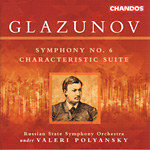Valeri Polyansky leads a moderately effective rendition of Glazunov’s Sixth Symphony with the Russian State Symphony Orchestra, which cultivates a suitably dark and brass-rich sound. In terms of orchestral timbre the performance recalls Vladimir Fedoseyev’s decades-old Melodiya recording. Polyansky does not match Fedoseyev’s fiery temperament (or for that matter Järvi’s or Anissimov’s)–especially so in the first movement, where Polyansky sounds underpowered by comparison. Nor does he expose the music’s manifold colors (woodwinds in particular) the way Otaka does with the BBC Wales Orchestra. But then, orchestral refinement and inner-voice clarity have not been the strong points of this series so far, especially in Chandos’ acoustically swimmy, detail-blurring recordings.
The Characteristic Suite comes off better. Here the conductor is fully alive to Glazunov’s vividly-colored orchestration and dancing rhythms. Polyansky also shows genuine tenderness in the Pastorale and Elegie–very nice, if all you care about is the suite. However, if the symphony is you main interest, you’ll do better with the alternatives listed above.
































